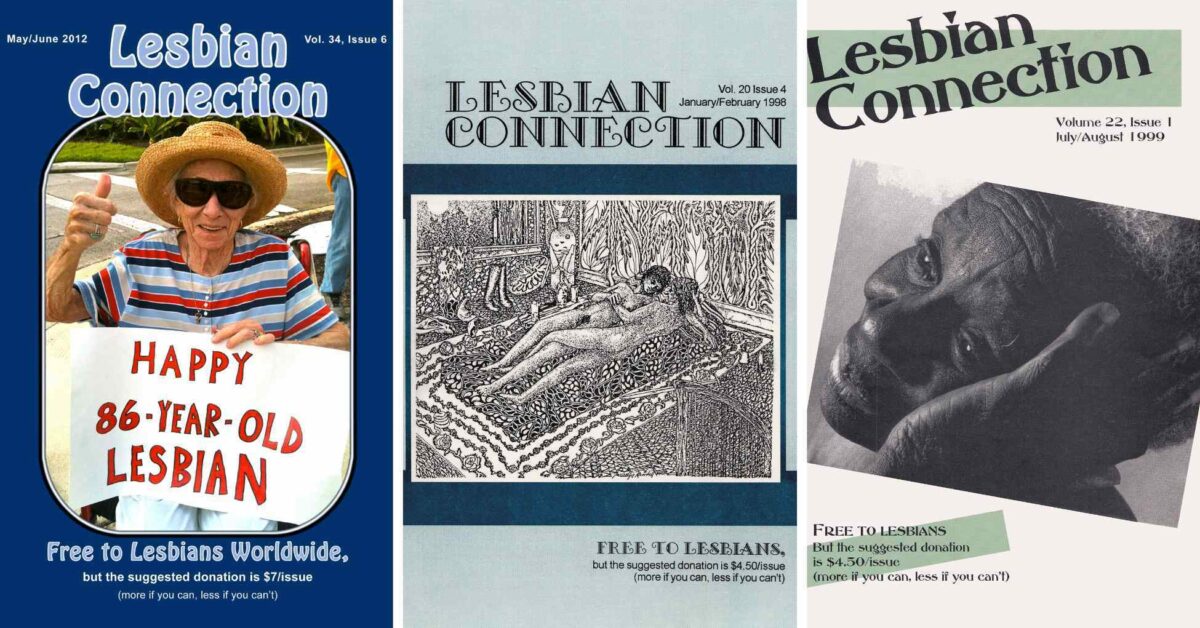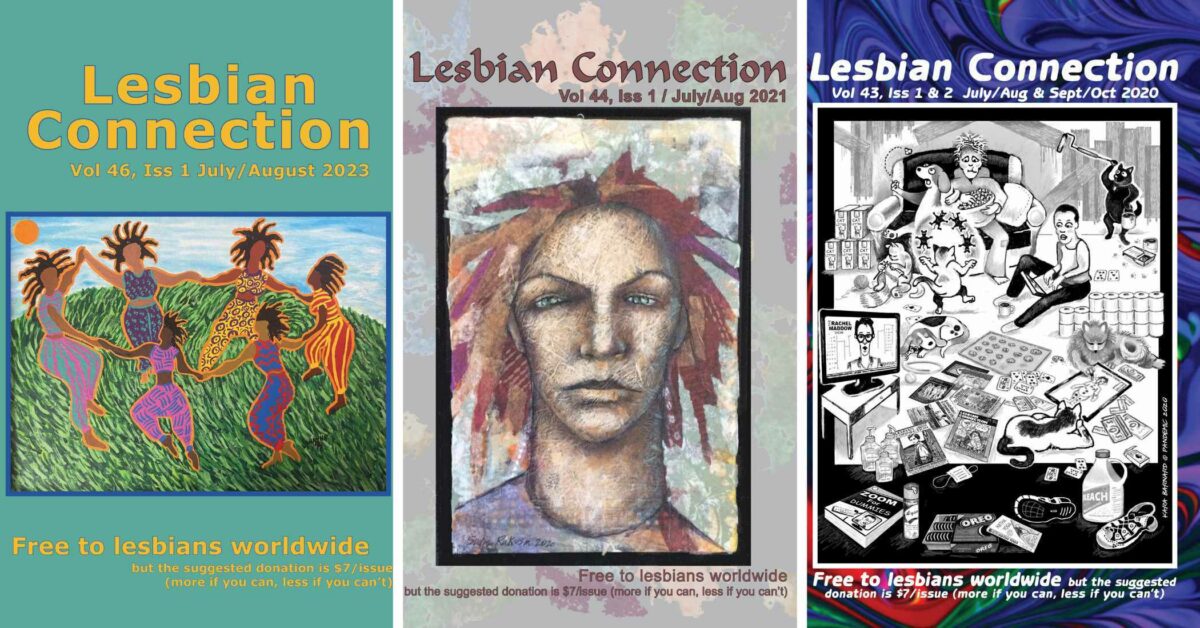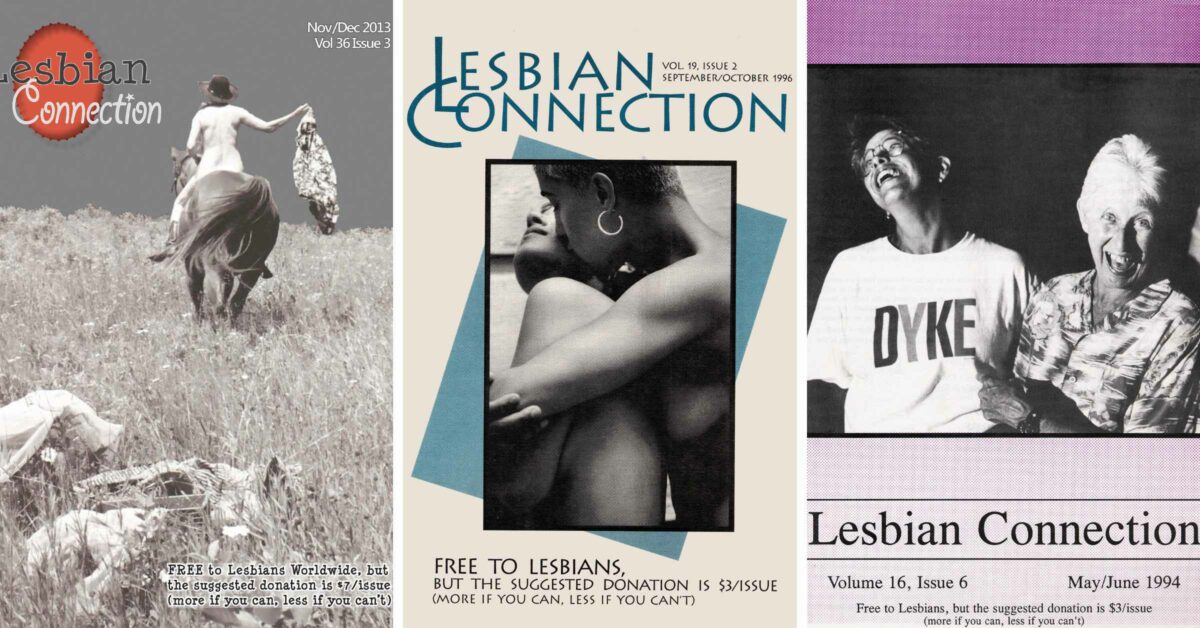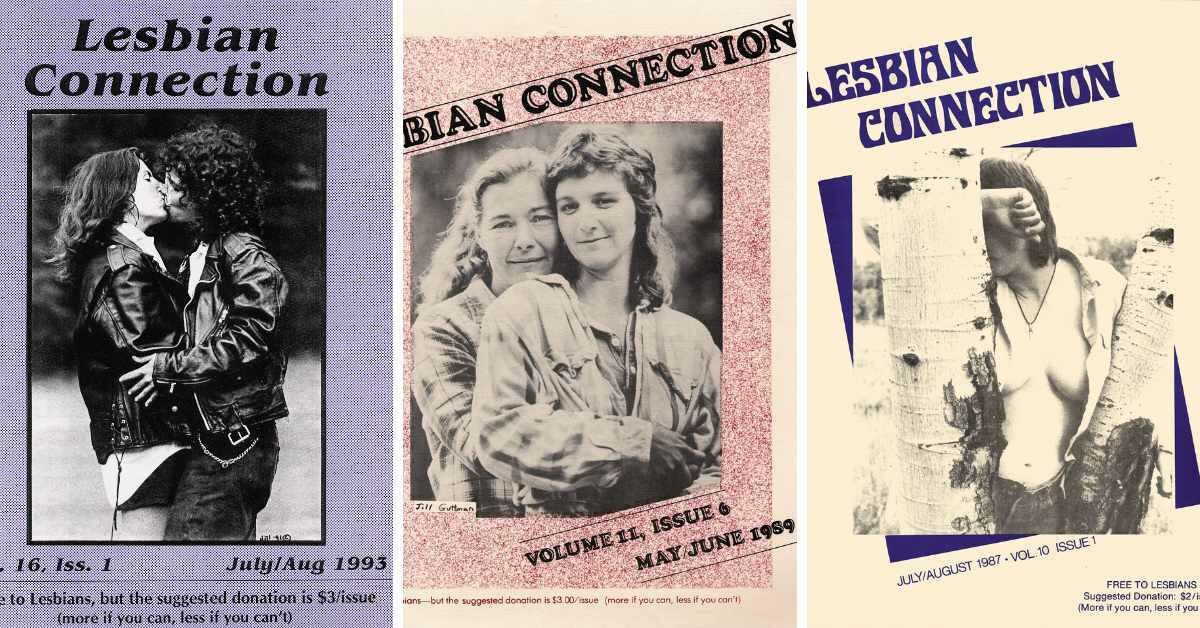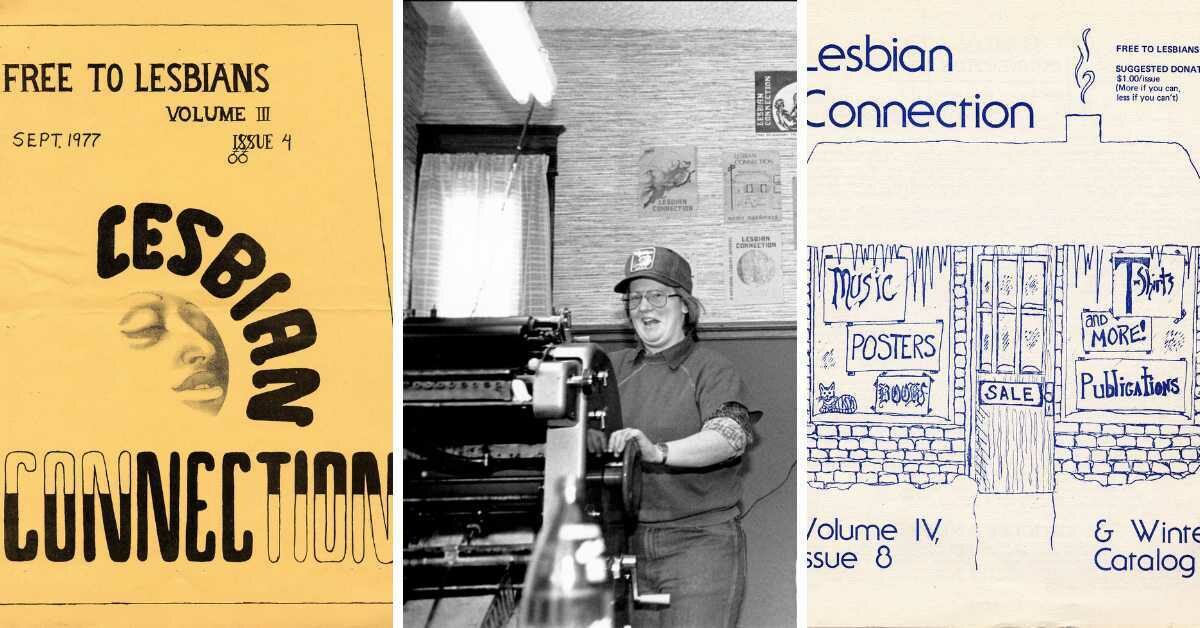Celebrating 50 Years of ‘Lesbian Connection’
In 1974, a group of women founded a forum for lesbians worldwide. The magazine will celebrate its 50th anniversary in Michigan’s Capitol this September.
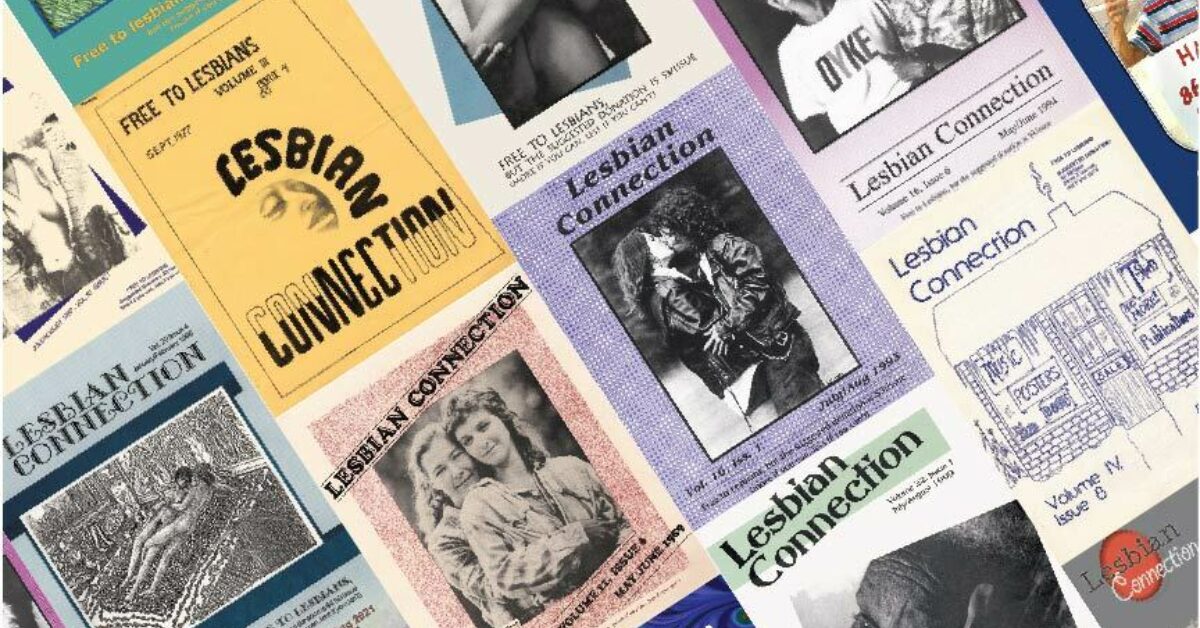
In every issue of Lesbian Connection, you’ll find messages of gratitude.
“Read your letter at a meeting and there was cheering afterwards,” a Wisconsin reader wrote in December 1974, for the publication’s second ever issue. “I think you have hit on a real neat idea.”
From a reader in the March/April 2024 issue: “You truly have meant so much to me all these years. I came out in 1970, and you’ve helped to validate my world over and over.”
Lesbian Connection, affectionately known as “LC” or “Elsie,” is unlike any other magazine published today. It ships worldwide every two months, but subscriptions are free. It has featured advertisements for Subaru and “The L Word,” but you’ll never see a glossy celebrity on its cover. The vast majority of content, including the cover art, comes from readers.
As a result, you’re just as likely to open a new issue to a provocative political letter as you are to flip to a photo of someone’s thriving tomato plants (January/February 2021) or to a recipe for vegan Sloppy Joes (September/October 2019). Lists of “Contact Dykes” and lesbian-friendly retreats offer subscribers a safe, easy way to make travel plans — and possibly to connect with other lesbians around the world.
For 50 years, Lesbian Connection has survived where countless bars and bookstores couldn’t, offering lifesaving community and open dialogue to readers in rural areas, unaccepting families and even prison. The forum, which will celebrate its golden anniversary this September in Lansing, started with a borrowed mimeograph machine and a dream: to broadcast lesbian issues, news and events to as many lesbians as possible.
A brief herstory
The Ambitious Amazons, a group of nine women in the Lansing area, published the first “LC” in October of 1974.
“We see a real need for a national newsletter,” the Amazons wrote in a flier announcing the publication to over 400 lesbian and women’s organizations. “There are many national feminist publications and several gay liberation newspapers. But there are no papers that we know of dealing with current news that is pertinent and accessible to all lesbians.”
That first issue was composed of 17 colorful, mimeographed sheets stapled together by hand. It included an announcement for the Lesbian Mothers National Defense Fund — an effort to help lesbian mothers retain custody of their children despite homophobic prejudice — and a feature about North American sodomy laws. It was, to put it lightly, a difficult time to be a lesbian — an era of persecution that, because of that generation’s efforts, would become unrecognizable to future readers.
If one object could symbolize that early era of persecution — and two decades of LC — it would be a stapler.
From 1974 until 1995, the grassroots forum was sent out folded in half and stapled shut. Some subscribers had an E on their address labels, meaning they’d requested extra staples. Readers still send in letters about “the staple days” today.
“We even, at one point, sold staple removers that said ‘LC, connecting lesbians since 1974,’” Margy Lesher, one of the founding Amazons, recalled in a phone interview.
Despite these efforts, LC has lost plenty of issues to unsympathetic parties over the years. Guards have destroyed the magazines before they could reach incarcerated subscribers. In the early days, a closeted teenager would sign up for an issue, only to have her parents discover it and alert authorities.
“We would get this form letter from the post office saying that we sent an issue to a residence where there was a minor and the family complained,” Lesher explained. “It was considered obscene material.”
Passing on a legacy
The Amazons have persevered despite it all. Now, issues are distributed in plain, brown envelopes, and they’ve foregone DIY printing in favor of local services. They have two offices near downtown Lansing, one for their six full-time, onsite staff — and two office cats — and one for in-house production and mailing. They also run a lesbian lending library from the latter location.
The publishing schedule was thrown off for a bit, but the magazine survived the height of the Covid pandemic.
Though they originally asked international readers to help pay for postage, the Amazons soon decided it would be more in line with their principles to eat the cost. Lesbian Connection is, as they say on every cover, truly “free to lesbians worldwide.” They can even pay their staff.
“Maybe 10 percent or less of our money comes from advertising,” Lesher said, “but the rest is all donations.”
Women have given generously to LC, sending checks, cash and even food stamps by mail. A lot of donations now come through the magazine’s website.
Some women leave bequests to LC. In July of last year, the current staff was floored when they received a check for over $329,000, courtesy of a longtime reader who had passed in October of 2021.
The “Passings” section in each issue features obituaries by and for LC readers, often submitted by partners of the deceased.
Jeanne Arnold, 92, became a subscriber in 1979. She and her partner, Barbara, ran Mother Courage Bookstore and Mother Courage Press in Racine, Wisconsin. They proudly distributed copies of Lesbian Connection at the bookstore, and when Barbara passed in 2013, Jeanne sent her obituary to the magazine.
“Lesbian Connection printed my announcement of her parting, which was really beautiful,” Arnold said in a phone interview. “Lesbian friends of ours said they cried when they read it. And every time I get my issue now, I look at that first, to see if I knew anybody.”
“Passings” aren’t just a beacon for older women; they also show young readers that it’s possible to live fully, happy, lesbian lives.
Laurel McBride, a 35-year-old reader in Vancouver, Canada, says that “Passings” is one of her favorite parts of the magazine.
“For younger women, we get some insight into what the conditions were like in the ’50s, ’60s, ’70s — of the difficulties, but also the ways that they made their lives joyful,” she said in a phone interview. “I just think there's so much to learn there, and so much to recognize. If we don't do that for each other, no one's going to do it for us.”
The next chapter
The first generation of LC readers and writers is waning, as are old-school lesbian-feminist venues like women’s bookstores and festivals. Readership peaked around the year 2000, with a circulation of about 28,000. It now sits around 15,000.
But young lesbians are still finding solace in the forum. Nary an issue goes by without at least one letter from a teen- or college-aged reader grateful for her new discovery.
“Where young women used to pick us up in bookstores, they’re now finding us in their online communities,” Lisy Harmon, one of the current Ambitious Amazons, said in a phone interview. She mentioned that their numbers have gone up recently, with subscribers saying they came from places like Tumblr, Discord and Instagram.
Despite our increasingly digital culture, LC remains committed to its print model, though they send readers digital issues, rather than physical ones, upon request.
Likely as a result, LC is notable for its wide-ranging, level-headed coverage of everything from childhood sexual abuse to coming out late in life.
“They will print it all, and women get to be in conversation with one another,” said McBride, the young subscriber from Vancouver. “And I think because it's in a written form, you don’t get the dopamine hit of writing your take on social media.”
“We’ve been referred to as the original lesbian message board,” said Harmon. “You just have to wait two months for your response.”
Readers can enjoy a quicker repartée — as well as performances, auctions, dinner and a dance — at the publication’s 50th anniversary celebration in Lansing this September. To find out more, you can contact their offices by calling 517-371-5257 or emailing [email protected].
